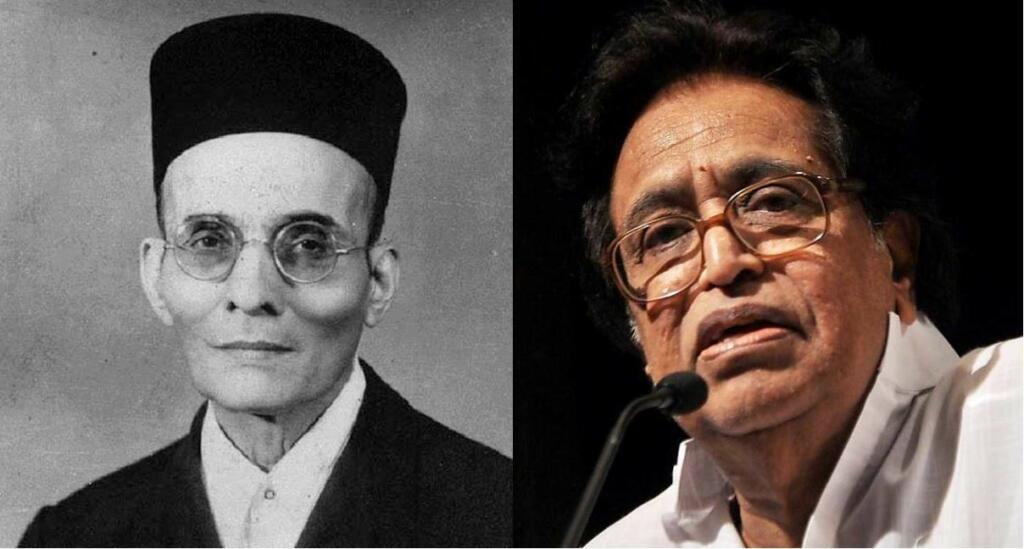The second volume of Swatantaryaveer Vinayak Damodar Savarkar has been released by author and historian Vikram Sampath and it mentions many historical incidents that were conveniently omitted by the Marxist historians who have been dominant in academic and intellectual circles so far.
One such incident, which exposes the illiberalism of the Congress party and its pet intellectuals, is the sacking of musician Pandit Hridaynath Mangeshkar from All India Radio for composing music to Savarkar’s famous poem.
Years later, in an interview with ABP Manja, Pandit Mangeskar, who is the brother of Lata Mangeshkar and Asha Bhosle, revealed that he was fired from All India Radio for the music composition on Savarkar’s famous poem.
“I was working in All India Radio at that time. I was 17 years old and my salary was Rs 500 per month. It may be peanuts today but Rs 500 was considered a big fat salary during that time…but I was summarily fired from the All India Radio because I chose to create a musical composition for Veer Savarkar’s famous poem ‘Ne majsi ne parat matrubhoomila, sagara pran talmalala‘,” Mangeshkar said in Marathi.
Sampath has mentioned this incident in the second volume of the book on Savarkar titled Savarkar: A Contested Legacy, 1924-1966. In an interview with Navika Kumar of Times Now on his new book, Sampath said, “Liberals don’t allow a different point of view to thrive. In India particularly, there is a very narrow narrative that needs to be pushed when it comes to history.”
Well said @vikramsampath pic.twitter.com/jzlo9G7VZR
— Shefali Vaidya. 🇮🇳 (@ShefVaidya) July 26, 2021
“In post-independent India, there has been one dominant hegemonic version of history particularly of the freedom movement, invasions and troubling aspects of our long and stormy past,” he added.
The incident shows that cancel culture was prominent among the left-liberal intelligentsia even in those days, and not a new phenomenon; it got more recognition with the emergence of social media.
Savarkar is a public icon in the country, especially in the states like Maharashtra and Madhya Pradesh. In Maharashtra, even NCP venerates Savarkar, given popular sentiment in favour of the freedom fighter.
Savarkar has always been a hero, a freedom fighter, and a Nationalist poet in public folklore. But, the Congress governments- in the state as well as centre- avoided any confrontation on the celebration of Savarkar, as the popular version has no official/government recognition.
But since BJP came to power, there has been official recognition of the person who is a hero among the masses of the country. Two biographies of Savarkar have been published in the gap of less than a year by Vikram Sampath and Vaibhav Purandare. Both have been appreciated as work of considerable scholarship and were well received by critics, even those on the opposite side of the political spectrum.
So far, under the various regimes of the ‘Secular’ Congress party, the contribution of Savarkar was severely undermined, as the Congress did not like the Hindutva icon, whose rise would have helped parties like BJP and vice-versa.
Savarkar was the one who envisioned the idea of complete freedom and liberation from the chains of British slavery. In fact, the unconventional poet/writer was a trendsetter – man of many firsts, such as being the first one to give a detailed description of the 1857 Freedom Struggle, which irked the British into banning it even before its publication.
Congress has always been worried that with popular sentiment and official backing, Savarkar can become a public icon of Gandhi’s stature, and be venerated throughout the length and breadth of the country. Unfortunately for Congress, his memory has already been reinvigorated by the rise of PM Narendra Modi. This would not only harm the Congress party electorally, but the domination of Congress’s ideology in the intellectual ecosystem would also end.
